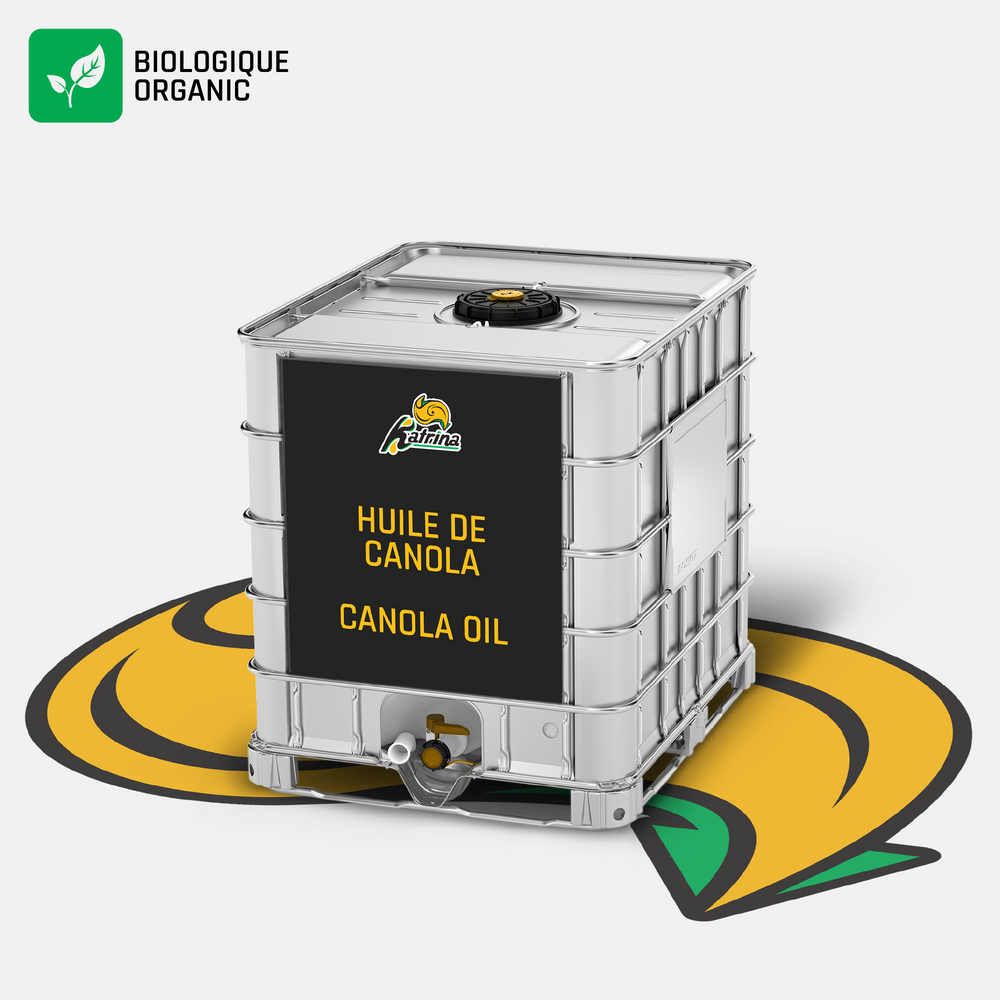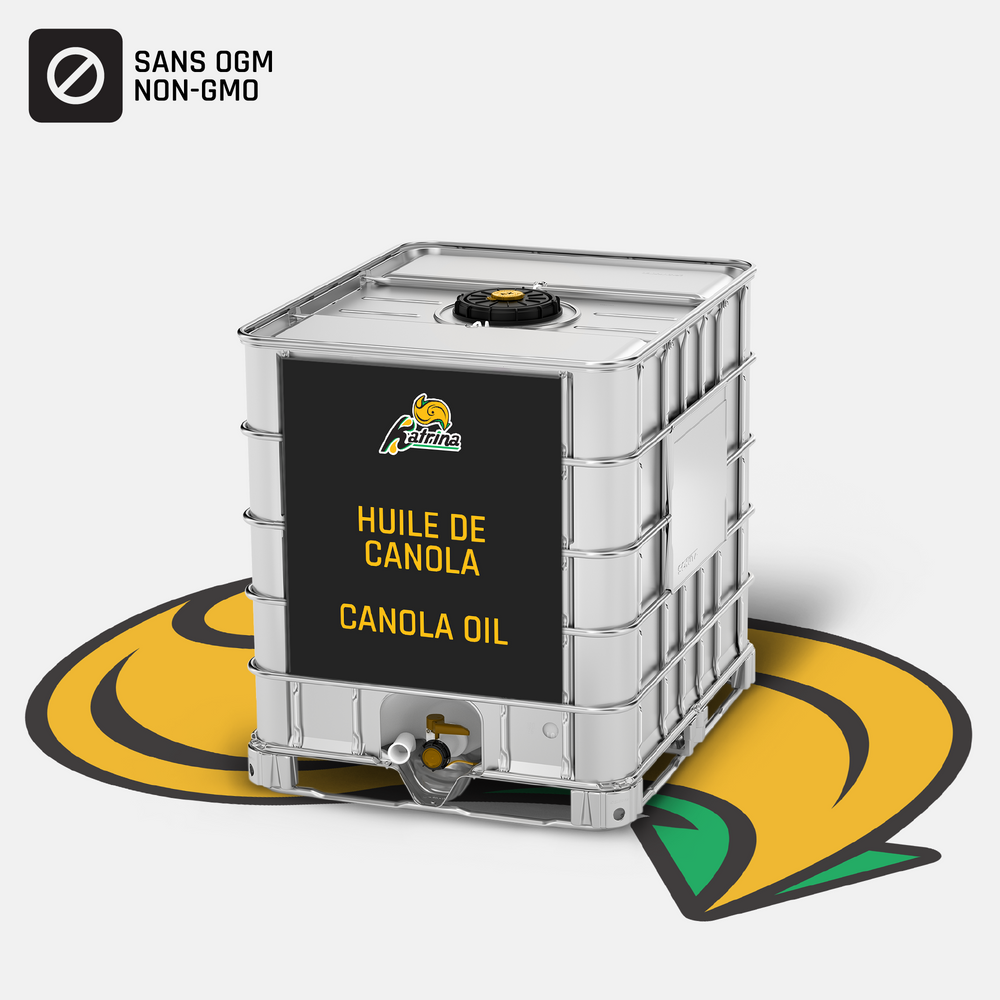Organic Canola Oil: Questions, Answers, and Resources
Organic canola oil is a widely popular and pragmatic choice for consumers seeking a healthy and versatile cooking oil. Let’s dive in to answer your questions, debunk myths, and provide valuable insights into the world of organic canola oil.
What Is Organic Canola Oil?
Organic Canola Oil Origins
Organic canola oil is a product of meticulous cultivation practices applied to canola (or “rapeseed”) plants. Exclusively grown without synthetic pesticides or fertilizers, this results in a delicious flavour, while also aligning with the principles of sustainable and environmentally conscious agriculture.
Certified Organic Standards
To earn the coveted 'organic' label, producers of canola oil must adhere to stringent certification standards. These standards, often regulated by organic certifying bodies, ensure that every drop of organic canola oil meets the criteria for purity and sustainability. Some organic certifications include:
- United States Department of Agriculture (USDA)
- Canadian Food Inspection Agency (CFIA)
- Organic Materials Review Institute (OMRI)
- Ecocert & Ecocert Canada
- Global Organic Alliance (GOA)
Flavour Profile and Culinary Versatility
The mild, neutral taste of organic canola oil makes it a versatile companion in the kitchen. It allows the natural flavours of ingredients to shine, making it suitable for a myriad of culinary applications, from sautéing and baking to dressing salads. Organic canola oil is also known for its high smoke, lending it to high-heat cooking, frying, and baking.
Is Organic Canola Oil Healthy?
Yes, organic canola oil is considered a healthy choice for cooking. Renowned for its low saturated fat content and high levels of heart-healthy monounsaturated fats, organic canola oil can be a beneficial addition to a balanced diet. Additionally, it is a good source of omega-3 fatty acids and contains vitamin E, an antioxidant that supports skin health. Choosing organic ensures that the canola oil is produced without synthetic pesticides or fertilizers, aligning with a commitment to cleaner, more environmentally sustainable farming practices. As with any cooking oil, moderation is key, but incorporating organic canola oil into your culinary repertoire can contribute positively to your overall health.
Canola Oil vs. Olive Oil: What’s The Difference?
Canola oil and olive oil, two widely used cooking oils, differ in their origins, flavour profiles, and nutritional compositions. Canola oil is extracted from rapeseed and has a mild, neutral taste, making it suitable for a variety of culinary applications. It is notably low in saturated fat and rich in heart-healthy monounsaturated fats.
On the other hand, olive oil, derived from pressed olives, offers a distinct and robust flavour, with variations like extra virgin olive oil providing additional health benefits due to its minimal processing and higher antioxidant content. While both oils are versatile in the kitchen, the choice between canola and olive oil often depends on personal taste preferences, cooking techniques, and desired health benefits.
Is There Non-GMO Canola Oil?
Non-GMO canola oil does exist! Canola oil is originally derived from rapeseed, and genetic modification was introduced to create a variant known as "Roundup Ready" canola, which is resistant to certain herbicides. However, traditional and non-GMO varieties of canola are still produced. Non-GMO canola oil is made from canola plants that have not been genetically modified. Many producers offer non-GMO options to cater to consumers who prefer a more traditional and natural form of canola oil.
Myths & Facts About Organic Canola Oil
Myth: All Canola Oil is Genetically Modified (GMO)
- Fact: While some varieties are genetically modified, organic canola oil can be produced from non-GMO plants, adhering to strict organic farming practices.
Myth: Organic Canola Oil Contains Harmful Chemicals
- Fact: Organic certification ensures that canola oil is produced without synthetic pesticides or fertilizers, making it free from harmful chemical residues.
Myth: Organic Canola Oil is Less Nutritious
- Fact: Organic canola oil retains its nutritional benefits, including being a good source of heart-healthy monounsaturated fats, omega-3 fatty acids, and vitamin E.
Myth: Organic Canola Oil Has a Strong, Unpleasant Flavour
- Fact: Organic canola oil has a mild, neutral flavour that makes it suitable for various culinary applications without overpowering the taste of dishes.
Myth: All Organic Oils Are Equal
- Fact: The term "organic" ensures adherence to organic farming standards, but variations in flavour, production methods, and nutritional content can still exist between different organic canola oil brands.
Myth: Organic Canola Oil is Not Environmentally Friendly
- Fact: Organic farming practices, which exclude synthetic chemicals, promote biodiversity, soil health, and reduced environmental impact, making organic canola oil an environmentally friendly choice.
Myth: Organic Canola Oil Is Excessively Expensive
- Fact: While organic products can be slightly pricier due to the cost of organic farming practices, the price difference is often narrowing as demand for organic options increases.
Benefits of Organic Canola Oil
Organic canola oil presents a range of benefits, making it a popular choice for health-conscious consumers. Produced from plants grown without synthetic pesticides or fertilizers, organic canola oil aligns with environmentally sustainable farming practices. Its nutritional profile boasts low saturated fat content and high levels of heart-healthy monounsaturated fats, making it a heart-conscious cooking oil. Additionally, it is a good source of omega-3 fatty acids and contains vitamin E, contributing to skin health and overall well-being. The mild, neutral flavour of organic canola oil enhances a variety of dishes, from sautés to baked goods, without overpowering the natural flavours of ingredients.
Choosing organic canola oil not only supports personal health but also reflects a commitment to sustainable and clean agriculture, which is what makes it an increasingly popular option across the world.
In conclusion, organic canola oil proves to be a great option for both restaurants and food manufacturers to cater to the needs of their consumers. As an environmental and health-conscious option, organic canola oil is perfect for a variety of products where high-heat, neutral oils are necessary.
If you want to learn more about our bulk vegetable oil options, please contact us or request a quote.








